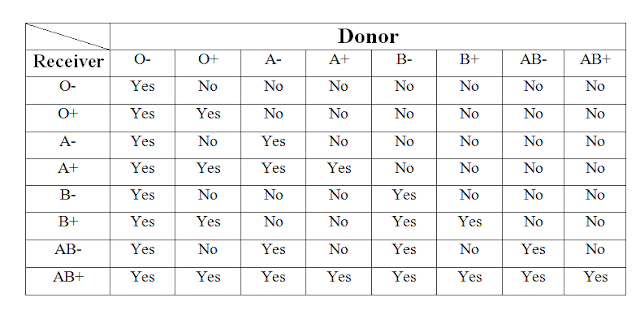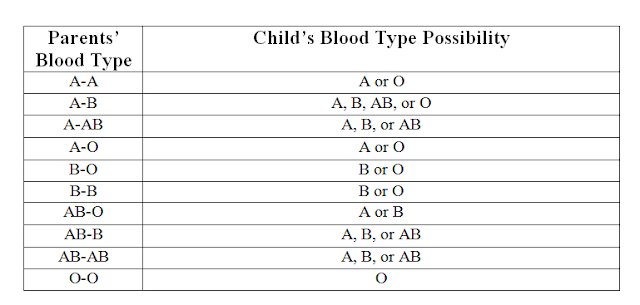Blood Types
One of many important human elements in a human body is blood. Adults usually have around 4.5 - 5.5 litter of blood circulating in the body. If they don't have blood in their body, they will lose around 10% of their weight. Although the color is the same, not all people have the same blood types.Different blood type is determined by the presence or absence of certain substance known as antigen on the red blood cells and blood plasma. Antigen can trigger immune system in the body if there is foreign substance in the body. If a cell with the opposite antigen enters into the body, then the immune system will begin a resistance against the cells that are considered foreign by producing antibodies.
ABO System and Rhesus System
Based on ABO system, blood types are categorized into 4 types; A, B, AB, and O.
These are the things you need to remember:
If your blood type is A, it means you have antigen A in your red blood cell and produce antibodies against red blood cell with antigen B.
If your blood type is B, it means you have antigen B in your red blood cell and produce antibodies against red blood cell with antigen A.
If your blood type is AB, it means you have antigen A and B in your red blood cell. It also means you don’t have antibodies A and B in your blood plasma.
If your blood type is O, it means you don’t have antigen A and B in your red blood cell and produce antibodies A and B in your blood plasma.
In the past, someone with the blood type O can donate their blood to anyone, but now it is no longer recommended. Blood type O negative has the possibility of having antibodies that can cause a serious reaction during the blood transfusion. While the blood type O positive can only be given in emergency situations, that is, if the patient life is being threatened or the supplies of the appropriate blood type is insufficient.
On the contrary, the AB blood type belongs to the universal receiver. They can get blood transfusion from A, B, AB, or O type. However, they can only donate their blood to those with blood type of AB only.
Rhesus (Rh) factor is antigen type on the red blood cells. If the blood has Rh factor, it is categorized as positive rhesus and if it doesn’t have the Rh factor it is categorized as negative rhesus.
People who have an Rh negative can donate their blood to someone who has the status of Rh negative and Rh positive, while people who have Rh positive can only give their blood to someone who has the status of Rh positive.
The following table can give an easier to understand illustration.
By knowing the characteristics of the blood, the risk you are exposed to the complications will be reduced. Incompatibility of Rh and ABO at the time of blood transfusions can cause a serious reaction that could endanger lives. Knowing the status of the Rh blood is also important for pregnant women.
The influence of parents’ blood type to a child
Your blood type and your partner’s blood type will determine the child’s blood type. But keep in mind that the child's blood type is not always exactly the same with the father’s or the mother’s. There are some combinations that make the kind of blood type is different.
The following table will tell you the possibility of your child’s blood type.
Knowing the blood type you
have can be very useful either for you or for others. Therefore, don’t forget
to check what blood type you have if you still don’t know it yet.



0 Response to "Blood Types"
Post a Comment